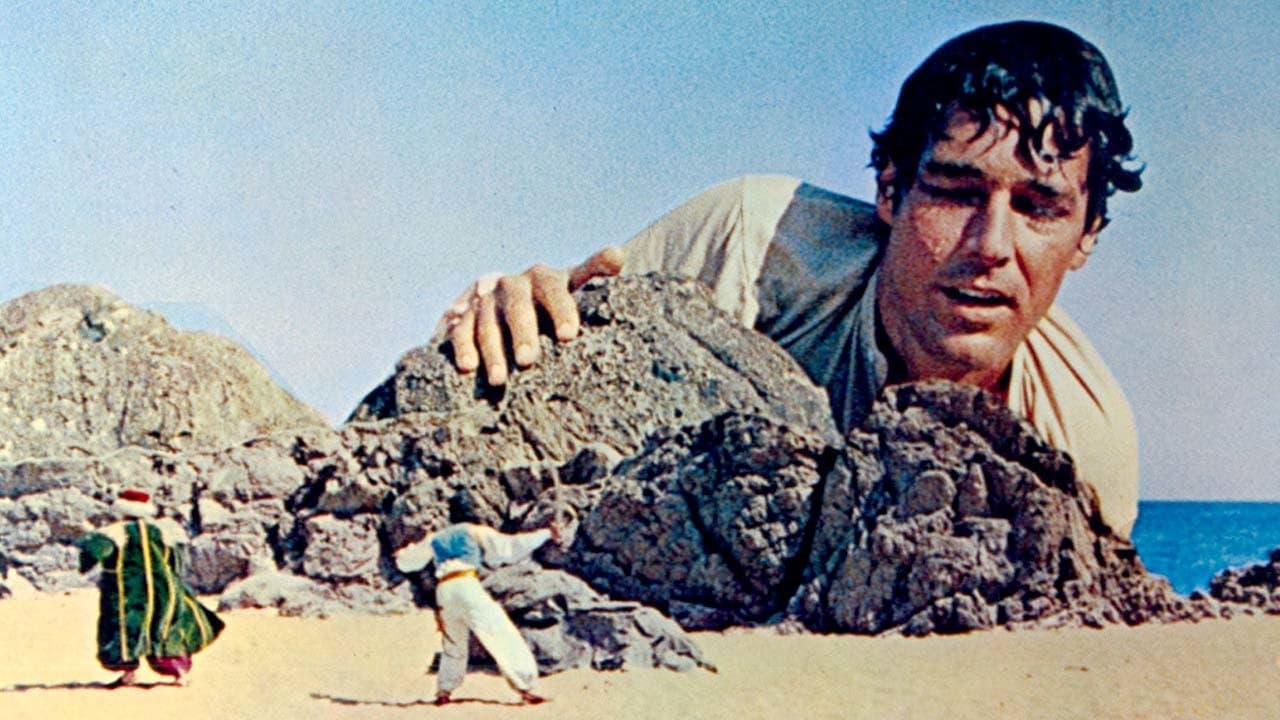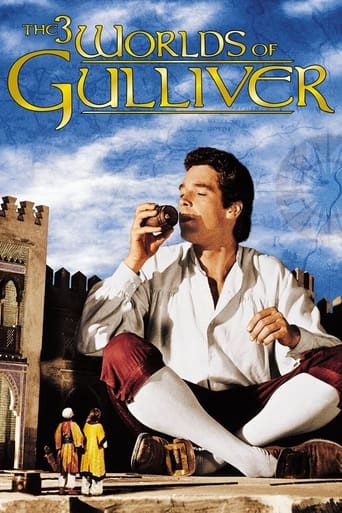Mjeteconer
Just perfect...
MamaGravity
good back-story, and good acting
Manthast
Absolutely amazing
Phillipa
Strong acting helps the film overcome an uncertain premise and create characters that hold our attention absolutely.
mark.waltz
In my senior year of high school, I took a class on children's literature and one of the books we were assigned to read was "Gulliver's Travels". At the time to me, it was very slow reading and I quickly lost interest. I knew the story from abbreviated versions of the novel and did not pick up on the political ramifications of the story. Almost 35 years later, the book remains a far- off memory. However, in studying cinema and watching this fetching looking version, the things that I missed are now as clear as crystal. Difference in appearances, being more popular than royal leaders and the ability to solve issues easier than those in charge makes him enemy of the state. He is Gulliver, a friendly giants from England visit who has landed on the island of Lilliput, of little people the size of his finger. They first think that he is some sort of monster, but his abilities to do things for them it which they couldn't imagine being done making popular, for the moment. The underlying meanings hidden inside the plot are still very potent today, and even if you don't pick those up on your initial reading or viewing of any of the Gulliver's Travels movies, you can still enjoy the movie for the fun fantasy that it is.As with several other Ray Harryhausen movies, the special effects use the best of stop motion. Kerwin Mathews is an excellent hero. Some tidbits of minor characters make you think that there will be a few subplots but they pretty much disappear with the rainstorm that Gulliver blows away. The film switched gears half way through when Gulliver finds himself in a world full of giants which gives the reminder that we are all small fish on a large planet and our differences are not meant that I divide us but make us closer.
Robert J. Maxwell
Jonathan Swift's novel, "Gulliver's Travels," is a classic satire from 1726. I once managed to get around to reading his "A Modest Proposal", in which -- apparently in all sincerity -- he suggests that the problem of overpopulation and malnutrition in his native Ireland can be cured simply by having the Irish eat their own children.Well, that's what satire is, I guess. A send up of current social issues with an element of viciousness that's usually absent from a mere parody. Swift must have found the mores of his time easy targets, just by reducing their characteristics to the absurd. Are the Irish causing you problems? Get rid of them.In "The 3 Worlds of Gulliver" the problems dealt with are (1) the causes of war among the tiny Lilliputians, and (2) science versus religion among the giant Brobdingnagians. I think some other adventures were deleted. I seem to remember Yahoos and Houyhnhnms and maybe one or two others. But the elisions are okay. Just two of the strange worlds Gulliver visits are enough for one movie. (The third world of the title is his home in England.) I don't know that this story has the same impact as it originally did. Maybe you need some kind of Skeleton Key to pick up the more arcane references, as with "Finnegans Wake," "Alice in Wonderland," or "The Master and Margarita." However, the broader points of the satire should be clear enough to everyone except the kids, who will be tickled by it because it's such a colorful fairy tale.Kerwin Mathews is an idealistic English doctor, Lemuel Gulliver who is washed overboard at sea and finds himself on an island inhabited by tiny people, the vaguely Arabic Lilliputians. Once the little people get over their astonishment -- because compared to them Gulliver is really HUGE -- they try to talk him into using his immense strength to destroy their enemies on a neighboring island. Man, are the Lilliputians petty, especially the sputtering king. "I have abiding faith in the trustworthiness and reliability of any man that I can kill," he announces. He's dying to go to war and kill his enemies because they open their eggs from the big side rather than the small side, as civilized Lilliputians do. The perceptive adults in the audience are, at this point, permitted to explain to the children that sometimes wars are fought for silly reasons. He wants a warmonger for a Prime Minister, although, "I don't need a Prime Minister to fight a war. I need one to blame if it goes wrong." Here, please explain to the children the meaning of the phrase, "The buck stops there." Gulliver promises to end the war and he does, by stealing the enemy's fleet so they can never attack Lilliput. This doesn't satisfy the king because it wasn't a proper war. How can you have a war without sacrifice and heroism? And besides, since Gulliver robbed the enemy of their fleet, we now have no need for Admirals and everybody in the Navy is now out of a job.A disgusted Gulliver finally manages to get off Lilliput but then lands on Brobdingnagia, a land of superstitious giants living a Medieval life style. (J. B. S. Haldane once wrote a famous essay explaining why giant humans were physically impossible.) At first they treat him well, an amusing toy for one of their gentle children, a pretty young girl named Glumdalclitch. But soon, after he beats the self-important king in a game of chess, and exposes the court magician as an ignoramus, he falls out of favor. He's smarter than they are. After all, he's a doctor and knows chemistry and science. The Brobdingnagians believe in witches and some of the stunts pulled by Gulliver -- treating the Queen's upset stomach with a mixture of opium and paragoric -- smack not just of elitism but of witchcraft. Besides, there is still that damme chess game. Who but a witch could check mate the King? So the Royal Court tries to burn him. Glumdalclitch makes it possible for him to escape.Gulliver barely makes it back to England. We see him on the beach with his bride, who was swept up in his adventures. It's not a happy ending. Nobody finds satisfaction right in his own back yard, like Dorothy in "The Wizard of Oz." His wife asks what will happen to the Lilliputians and the benighted Brobdingnagians. "They'll always be with us," he admits with chagrin. "And what of Glumdalclitch", the truly benign and compassionate kid who looked after them? "Waiting to be born," answers Gulliver solemnly. I don't think Dean Swift would have been surprised to find that 280 years later, she's still waiting. Maybe, as I age, my emotional apparatus is becoming more primitive or something, but I found that final exchange rather moving.There are many special visual effects but only two instances of Ray Harryhausen's stop-motion animals, one a squirrel and the other a crocodile. This isn't a monster movie. Bernard Hermann's score doesn't sound much like that of a monster movie either -- no galumphing BROOP broop, BROOP broop. It echoes the light-hearted quality of the story itself and the composer only rarely lapses into his usual effects. I think it's the best score Hermann wrote for any of his fantasies.
whpratt1
Never viewed this 1960 film dealing with Gulliver's travels and found it very enjoyable to view along with excellent photography. The story starts out with Dr. Lemuel Gulliver, (Kerwin Williams) having a fight with his girlfriend, Elizabeth, (June Thorburn) about his wanting to go aboard a ship as a doctor and she does not want him to leave. The ship sails and becomes shipwrecked and Gulliver finds himself in a completely different land where there are miniature people and he appears to them as a huge giant who must be captured and tied up. The rest of the story will hold your interest from the very beginning to the end and I almost forgot, a war was almost started over cutting an egg on the top and other people who cut their eggs on the bottom of the shell. Enjoy.
Sergeiii
Frankly, I didn't even expect a serious treatment of the novel - I thought it would do to Swift what other movies were doing to Verne and Wells at the time. And I could have lived with that perfectly. Unfortunately, "The 3 Worlds of Gulliver" does not achieve this level of entertainment.
First of all, the actor playing Gulliver is a bore. Well, he probably would have gotten away with it hadn't his part been so badly written. The Gulliver character is not discovering anything in this movie - he is a patronizing and moralistic missionary man; basically just out there to explain the achievements of his 'modern' culture to the primitives. So, don't expect adventure, expect sermons.Secondly, the jokes aren't funny. They are all about how stupid foreign cultures are and how much they need a lesson in democracy. The only really funny character is a young gothic girl who has a short appearance towards the end of the movie (and the actress is not even credited!).
Thirdly, the production values are poor. Ray Harryhausen worked on this - and it hardly shows. The cheesy special effects are OK with me, but the whole doesn't even look attractive in a nostalgic sort of way.Check this out if you must, maybe your kids will like it. But if you have respect for your children, show them the Max Fleischer cartoon. It's ten times funnier and far less pretentious.

